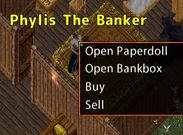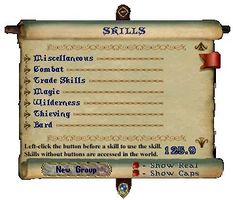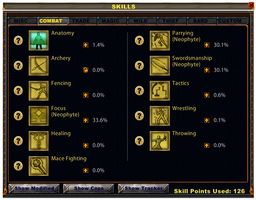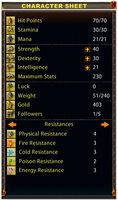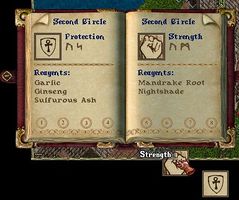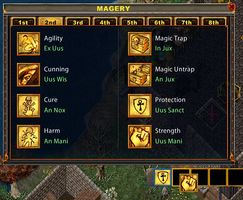Difference between revisions of "New Player Guide: Basics"
m (tbc) |
m |
||
| Line 144: | Line 144: | ||
| − | <!--Weapons --> | + | <!-- Weapons --> |
{| cellpadding="10" style="border: 1px solid darkgray;" | {| cellpadding="10" style="border: 1px solid darkgray;" | ||
| − | | width="120px" | | + | | width="120px" valign="top" | |
===Weapons=== | ===Weapons=== | ||
| − | [[File: | + | [[File:Longsword.png]] |
| + | [[File:Soul glaive.gif]] | ||
| + | [[File:Bow.png]] | ||
| + | [[File:Arrow.png]] | ||
| | | | ||
Weapons are any items that can be equipped in a character's hands and then used to do either melee or ranged damage to another target. They are wielded using either one or two hands. Weapons can possess a wide range of item properties, including damage increases, swing speed increases, abilities for leeching hit points or mana, casting various spells automatically upon a successful hit, and many more. | Weapons are any items that can be equipped in a character's hands and then used to do either melee or ranged damage to another target. They are wielded using either one or two hands. Weapons can possess a wide range of item properties, including damage increases, swing speed increases, abilities for leeching hit points or mana, casting various spells automatically upon a successful hit, and many more. | ||
| + | |||
| + | Weapons are usually categorized by what skill is required to wield them effectively: | ||
| + | *Archery weapons feature ranged attacks using expendable ammunition. Some examples are Bows and Crossbows. | ||
| + | *Fencing weapons are generally bladed and are designed to deal quick, stabbing strikes. Some examples are Daggers and Krysses. | ||
| + | *Mace Fighting weapons are bulky objects or staves, sometimes with spiky protuberances, that are designed for bashing opponents. Some examples are Maces and Quarter Staves. | ||
| + | *Practitioners of the Swordsmanship skill favor bladed weapons that are designed for slashing at opponents. Some examples are Katana and Viking Swords. | ||
| + | *Throwing weapons can only be used by Gargoyle characters as the Throwing skill is a combat skill unique to Gargoyles. | ||
|} | |} | ||
Revision as of 17:19, 24 February 2012
Basics
Now that you are more familiar with the interface, it is time to take a walk and get to know the town around you. Depending on your starting location, you are now inside the local Inn or the city Bank .
Inns & Banks |
Inns act as lodging places for travelers who seek shelter to rest safely. They are safe places where you can log out instantaneously. Banks provide a place of storage, also known as the |
Context Menu & NPCs |
The term Context Menu refers to a menu accessed by single clicking on something (or holding down shift, then single clicking on something, if one has selected the option to handle it that way). Several game mechanics can be accessed this way. A Non-Player Character (NPC) is any character that is not controlled by a player. The term's polar opposite is Player Character. Although not controlled by players, monsters and animals are not generally considered NPCs. Hostile NPCs are sometimes categorized with other creatures or monsters. Typical examples of NPCs include: Bankers, Minters, Healers, Vendors and Guards. You can also pay NPCs for training your Skills up to a certain level. |
|
| |
Skills |
Ultima Online has 58 different skills currently in game which determine the capabilities of your Character. You can expend up to 700 points between these however you desire. In order to improve in a skill you simply carry out the associated actions. For example, if you wish to train as a Swordsman, simply fight Monsters with a sword equipped. Likewise, casting a Fishing Pole out into the water is all it takes to become a better Fisherman. Each skill is associated with certain Statistics, which are trained in the same manner. You can usually pay NPCs for training up to a certain level. For example, visit your local blacksmith's shop and you should be able to learn some of their trade via their Context Menus. You will be expected to pay for these services, of course, though the Gold requested is a pittance. The gold amount is 1 GP per 1/10 of skill with the highest amount of skill costing 400 gold for 40 skill points. |
| |
Statistics |
Stats, an abbreviation of statistics, refers to the three statistics all characters have in varying amounts, as follows:
|
| |
Combat |
There are two kinds of combat:
You can initiate the combat by:
| ||||
| |||||
Note that if you are attacked, you will counter attack automatically, whether or not you're in War mode. | |||||
Spells |
Skilled spell casters are able to attack enemies, aid themselves and allies, move objects and themselves, create things out of nothing, summon creatures and a whole host of other actions that most people imagine when they think of magic. While some spells require the use of components, or reagents, in order to cast them, others do not. Spells are added to spellbooks by dropping an appropriate scroll onto the spellbook in question. Low level spell scrolls can be purchased from NPCs that are located in town magic shops, while high level scrolls can be found as loot on certain monsters. There are eight different spellbooks:
| ||
| |||
Weapons |
Weapons are any items that can be equipped in a character's hands and then used to do either melee or ranged damage to another target. They are wielded using either one or two hands. Weapons can possess a wide range of item properties, including damage increases, swing speed increases, abilities for leeching hit points or mana, casting various spells automatically upon a successful hit, and many more. Weapons are usually categorized by what skill is required to wield them effectively:
|
Previous: Introduction to the Interface |
Next: Hints and Tips |


